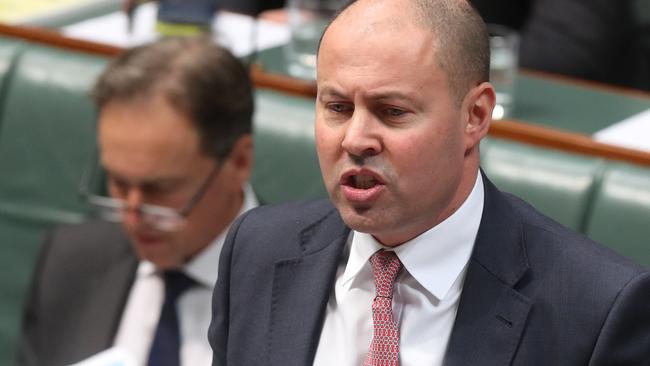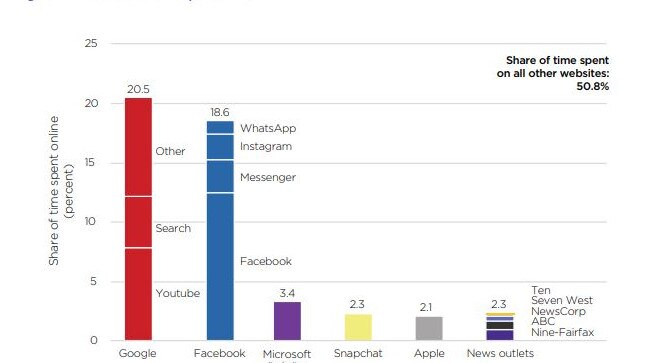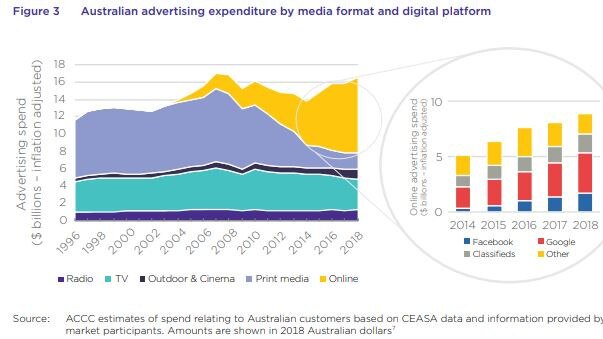ACCC recommends overhaul on how digital giants operate
Issues caused by the dominance of companies like Facebook and Google are too important to trust the industry to fix itself, regulators say.

The “trust us” response offered by the likes of Google and Facebook to the problems regulators say are caused by their market power is not good enough, consumer watchdog Rod Sims says.
Launching the final report of the Australian Competition and Consumer Commission’s digital platform inquiry with Treasurer Josh Frydenberg on Friday, ACCC chair Mr Sims revealed the regulator has launched five separate investigations into the tech giants as a result of inquiry.
The inquiry was launched in December 2017 under pressure from then independent senator Nick Xenephon and was designed to examine the impact of digital platforms on the traditional media.
Mr Sims said it has uncovered many “adverse effects” associated with Google and Facebook.
They included that distorting the ability of businesses to compete on their merits in advertising, media and a range of other markets, opaque digital advertising markets with highly uncertain money flows, consumers not being adequately informed about how their data is collected and used and disinformation and a rising mistrust of news linked to the behaviour of the tech giants.
“The dominant digital platforms’ response to the issues we have raised might best be described as ‘trust us’,” Mr Sims said.
“There is nothing wrong with being highly focused on revenue growth and providing increasing value to shareholders; indeed it can be admired. But we believe the issues we have uncovered during this inquiry are too important to be left to the companies themselves.”
Media companies will make more money if the Morrison government implemented the recommendations of his landmark report into the role of multi-national digital platforms and the impact on traditional media.
Ina widely anticipated report, the ACCC recommended overhauling the way digital platform operate, inlcuding ongoing monitoring of Google and Facebook prioritisation of news and advertising and the way they manage the privacy of millions of Australians.
Formed after an 18-month inquiry, the recommendations include a specialised digital branch be established within the competition watchdog “to build on and develop expertise in digital markets and the use of algorithms”.
ACCC report: Mobile users click here
However the final report backs away from a preliminary recommendation to create a new regulatory body to monitor the digital giants and how their algorithms are created and used. It also does not recommended the break-up of Google or Facebook advertising and search engine arms in Australia.

Releasing the landmark report into the impact of digital platforms, Mr Frydenberg called it “a truly a world first, looking at the impact on competition, privacy and consumer outcomes arising from the significant market power of the leading search engines and social media platforms.”
.@JoshFrydenberg responds to ACCC’s digital inquiry:
— Sky News Australia (@SkyNewsAust) July 26, 2019
There is an imbalance of bargaining power between Google and media businesses, and between Facebook and media businesses.
MORE: https://t.co/lYQGORPXmt #amagenda pic.twitter.com/yN5gQfqSHd
Following billions of dollars in fines being levied at Facebook and Google in recent times the report has also recommended changes to merger laws as well as internet browser defaults.

“They need to be held to account, and their activities need to be more transparent.”
“This report comes days after the US Federal Trade Commission fined Facebook over $7 billion for misleading consumers about the use of their data.
“The world has never before seen so much commercially sensitive and personal data collected and aggregated in just two companies.
“Our legislative and regulatory framework could not and did not anticipate such a new paradigm.”
Follow through on real reforms: Miller
Executive chairman of News Corp Australasia, Michael Miller, welcomed the “strength of the language and identification of the problems created by the dominance and immense market power of the digital platforms”.
Mr Miller also said he was encouraged by the “stated determination of the government to address these problems” but urged the government to follow through on real reforms.
“The recommended regulatory and legislative measures must be powerful enough to correct the adverse effects associated with digital platforms and their impact on Australian consumers and businesses, including news content creators,” Mr Miller said.
“We will work with the government to ensure their commitment is matched by real change.”
The Government will provide its final response to the report’s recommendation before year’s end.
While the initial report recommended a new body to monitor Facebook and Google’s use of news feeds and whether they favour their own companies and clients, the final report has recommended placing a separate body within the ACCC to “beef-up” its own powers.
“In the interim report, they left open the possibility of a new regulatory body. In this final report they suggest the most effective way and indeed the quickest way to deliver results for consumers is through a strengthened legislative and regulatory framework and beefing up the resources of the ACCC,” Mr Frydenberg said.
“The ACCC will now have a standing office within that organisation, focusing on digital platforms, having people there who are experienced and with expertise in data collection, in the relevant legal issues and with the media.”
The new body within the ACCC would monitor and investigate instances of potentially anti-competitive conduct and conduct causing consumer harm by digital platforms, which impact consumers, advertisers or other business users — including news media businesses.
Another 18 month inquiry will take place within the ACCC specialist digital platforms branch into competition for the supply of ad tech services and the supply of online advertising services by advertising and media agencies.
Matters to be taken into account into the inquiry include; how a lack of transparency is impacting the efficient operation of these markets; the prices charged by suppliers of these services and the share of advertising expenditure they retain — including whether excessive margins are obtained.
Fake news
Fake news and disinformation will look to be countered with a new code of conduct likely administered by media regulator ACMA.
The code will investigate instances of disinformation that represent a “serious public detriment” and will be given information-gathering powers enabling it to investigate and respond to systemic contraventions of the new code requirements, as well as powers to impose “large sanctions to act as an effective deterrent.”
“Google and Facebook need to listen”
Campbell Reid, News Corp Australia’s Group Executive of corporate affairs and policy, congratulated Treasurer Frydenberg and Mr Fletcher for the “strength of their language” in “identifying the full breadth of the problems the platforms have created”, and implored Google and Facebook to “listen very carefully” to the government and start co-operating with media companies.
“I would say though that the fair and transparent and commercially viable terms and agreements between content creators and the platforms is something that we have been negotiating for decades now, and any progress we have made has been at absolute snail’s pace,” Mr Reid said.
Mr Reid implored the government to act on the ACCC’s recommendations as soon as possible.
“What we would be concerned about is that any measures that the government now puts in place actually do achieve the results that need to happen to ensure that there is a stable and viable media industry going forward.
“We welcome the opportunity to talk to the government between now and their final recommendations to ensure that there is a real open mind about what is put in place, to ensure that the problem that the government and the ACCC have so forcefully addressed … that the remedies actually achieve what is required.”




To join the conversation, please log in. Don't have an account? Register
Join the conversation, you are commenting as Logout